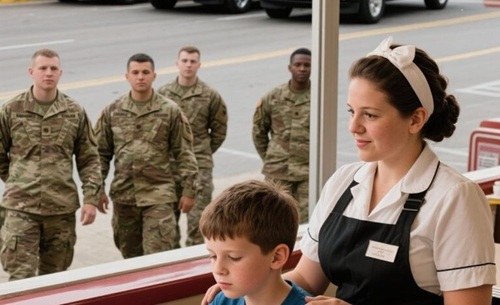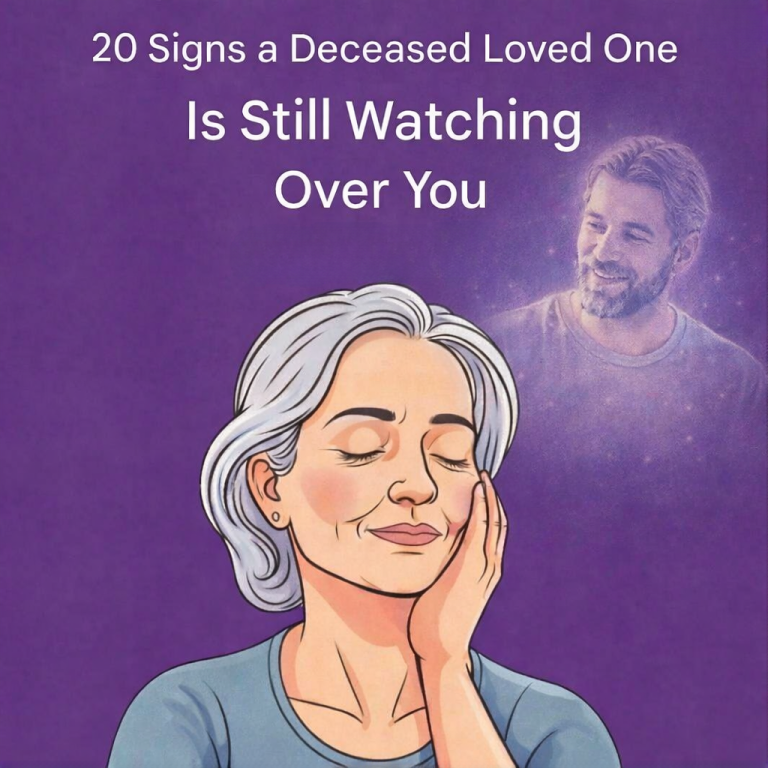
The Waitress and the Boy Who Changed a Town
Each morning, a waitress would softly bring breakfast to a lonely boy — until the day four black SUVs appeared outside the diner, and soldiers walked in with a letter that left the entire community speechless.
In the quiet town of Brookfield, Kansas, life moved at the pace of an old clock. The streets were lined with aging maples and fading storefronts, and at the heart of it all stood Rosie’s Diner — a chrome-wrapped relic from the 1950s that smelled of bacon grease, coffee, and stories.
Behind the counter worked Jenny Millers, a waitress with tired eyes and a soft heart. She was known for her smile — the kind that warmed people before their first cup of coffee — but few knew how much loneliness hid behind it.
Jenny had lost her parents in a car accident when she was sixteen. Her aunt raised her for a while, but when the older woman moved to Florida, Jenny stayed behind, too rooted in her memories to start over somewhere new. Her life became a quiet routine: the early shift, the same coffee pot, the same jukebox songs humming in the background.
One chilly October morning, the bell above the diner door jingled, and a boy walked in.
He looked about ten years old — small for his age, with dark circles under his eyes and a backpack that seemed too heavy for him. He slid into the corner booth by the window, the one near the radiator, and stared out into the fog.
When Jenny approached, he didn’t look up.
“What can I get you, sweetheart?” she asked gently.
He hesitated before whispering, “Just… water, please.”
Jenny frowned but didn’t press. She poured him a glass and left him alone. The next morning, at exactly 7:15 a.m., the boy was back — same booth, same backpack, same request.
Day after day, the pattern repeated. He never ordered food, just water, and sat quietly for thirty minutes before slipping away.
One morning, Jenny noticed his fingers trembling as he held the glass. His lips were pale. That’s when she made a decision.
Also READ : 40 BIKERS TOOK SHIFTS HOLDING DYING LITTLE GIRL’S HAND FOR 3 MONTHS SO SHE’D NEVER WAKE UP ALONE IN HOSPICE
She told the cook she was bringing “leftovers” from the kitchen and carried a plate of pancakes to his table.
“These were about to go to waste,” she said softly. “You’d be doing me a favor if you helped me finish them.”
The boy looked up, startled. His eyes darted from her to the plate.
After a moment’s hesitation, he picked up the fork.
He ate every bite.
When he finished, he looked at Jenny with the smallest, shyest smile. “Thank you,” he whispered.
From that day on, breakfast for the boy became part of Jenny’s morning ritual. Sometimes it was pancakes. Sometimes scrambled eggs, toast, or oatmeal on the colder days.
Neither of them ever exchanged names. They didn’t need to.
The quiet between them said enough.
Word began to spread around Brookfield. Regulars started whispering about the mysterious boy and the waitress who kept feeding him.
Harold, the retired postman, said he’d seen the kid wandering the streets alone at night. Others warned Jenny to “be careful” — that maybe he was trouble.
Her manager scolded her for giving away free meals. “You can’t feed every hungry soul that walks in here, Jen,” he grumbled.
“I don’t need to feed them all,” she replied. “Just the one in front of me.”
So, she paid for his meals out of her own tips.
Jenny often thought about her late father, a medic in the Army.
She kept one of his old journal entries tucked in her apron pocket. In it, he had written about sharing food with a hungry child during deployment — how, even in war, kindness was a weapon against despair.
She carried those words like a compass: “No one ever becomes poorer by giving.”
Then, one gray morning, the boy didn’t show up.
Jenny waited, glancing at the clock every few minutes. When the hands reached 7:30, she sighed and poured him a glass of water anyway.
He didn’t come the next day. Or the next.
For three weeks, his booth sat empty. Every morning, Jenny still left a plate of pancakes there — a quiet hope she couldn’t let go of.
Then, on the twenty-third day, something extraordinary happened.
Four black SUVs pulled up outside Rosie’s Diner.
The sight was strange enough to turn heads — the vehicles were spotless, official-looking, and out of place in sleepy Brookfield.
The diner door swung open, and in stepped four men in military uniforms, their boots echoing against the tile. At their head was Colonel David Reeves, a tall man with silver hair and steady eyes.
The chatter in the diner fell to silence. Forks froze midair. Jenny’s heart pounded as the men approached the counter.
“Are you Jenny Millers?” the colonel asked.
She nodded slowly, her voice caught in her throat.
He reached into his jacket and pulled out a folded envelope. “Ma’am,” he said solemnly, “this is for you.”
The envelope bore the seal of the U.S. Army. Jenny’s hands trembled as she opened it.
Inside was a handwritten letter, neat and careful — and signed James Thompson, Master Sergeant.
Jenny’s eyes darted to the name. “James Thompson…” she whispered. “Who is—?”
The colonel’s voice softened. “He’s the father of the boy you’ve been feeding. His name is Adam Thompson.”
Jenny’s knees weakened. She gripped the counter for support.
Colonel Reeves continued, “Sergeant Thompson was deployed overseas. His wife left some time ago. The boy… was surviving on his own while his father was away.”
He paused, his voice heavy. “Sergeant Thompson was killed in action last month. Before his death, he wrote this letter.”
Jenny unfolded the paper fully and began to read.
“To the kind waitress who made sure my boy was never hungry —
I don’t know your name, but I know your kindness. My son wrote to me about the lady at the diner who gave him pancakes ‘from heaven.’
You reminded him what goodness looks like in a world that sometimes forgets. Thank you for giving him dignity when I couldn’t be there to do it myself.
If you’re reading this, it means I didn’t make it home. But please know that your small acts of compassion meant more to my son than you’ll ever realize. You gave him hope — and that gave me peace.
With gratitude,
Master Sergeant James Thompson.”
Tears blurred Jenny’s vision. The letter trembled in her hands.
The entire diner had gone silent. Even the coffee pot had stopped hissing.
A moment later, the colonel cleared his throat. “Adam is safe now. He’s with a foster family nearby, but he insisted we deliver this personally. He wanted you to know… he never forgot you.”
Jenny pressed the letter to her chest, sobbing quietly.
Outside, the town gathered as word spread. The woman who had once been just “the lonely waitress” had become something else entirely — a reminder of compassion in its purest form.
A week later, Rosie’s Diner placed a brass plaque on the wall above the boy’s favorite booth.
It read:
“In Honor of Adam and Master Sergeant James Thompson — and the kindness that feeds the soul.”
The community rallied together to start a fund for local children of deployed soldiers, named The Pancake Promise.
And every morning, Jenny still places a plate of pancakes at that corner booth — sometimes for a stranger, sometimes just as a memory.
When asked once why she kept doing it, Jenny simply smiled.
“Because someone once fed me when I was lost,” she said. “And I think the best way to say thank you… is to feed someone else.”
That small act — one plate of pancakes — became a legacy in Brookfield.
A reminder that even the quietest kindness can echo louder than gunfire.
And that love, given freely, has the power to feed more than just hunger.



